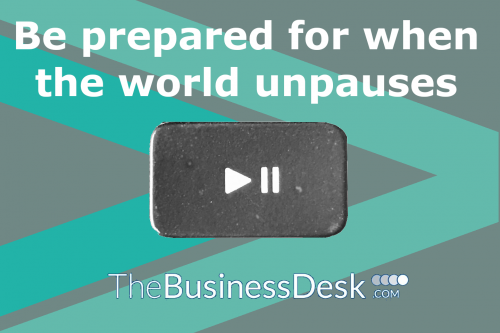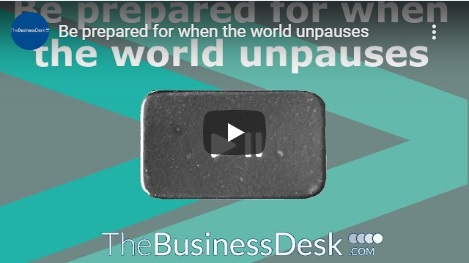Communication key to business success post Covid

The current Covid-19 pandemic has pushed the pause button on business. Leaders have been quick to address the impact of the virus and move to make their organisations as responsive and resilient as possible.
However, in these unprecedented times and with no clear timeline for the end of lockdown how do businesses prepare for the only certainty; the world unpausing? That was the question posed to a group of business leaders during TheBusinessDesk.com’s latest virtual seminar.
James Harding-Terry, the co-owner and managing director of Steetly Corner Group, which includes a number of manufacturing businesses explained how they’d adapted and also that he’s seen businesses – supplied and customers “closing for random amounts of time, either through not understanding the regulations or not being able to comply with them.” His opinion was “it’s primarily the former” and that one thing everyone can do to prepare for the unpausing is to actively look to the Government rules rather than the media headline.
In fact, the misunderstanding often caused through miscommunication Harding-Terry said will ” have a much bigger impact on our economy as we come out of this.” Gareth Harris, regional head of restructuring at RSM adds, “The big question for me really is how quickly will we come out of it? And how will the economy be released?” He spoke of how examples internationally show it will be a slow process and therefore how businesses need to be preparing for “at least another four or five months” before business begins to get back to normal.
He adds that this situation may mean “things may have changed quite significantly”, citing retail as one example. He spoke of how Amazon and other online retailers have been busy dealing with the increased demands as consumers move their buying habits further online, however this could the leisure sector “because I think people will be looking more for leisure pursuits.”
“I can’t really see a return to business as usual until the next calendar year” Roger Hutton, joint managing partner at law firm Clarion added. ” I think demand will depend on sector by sector. One of my issues, would be that the level of unemployment this [pandemic] creates and what that does to demand in retail and different sectors, who’s got what money to spend?”
Hutton also added that on a financial point many businesses Clarion are advising have a contingency of up to a 20% reduction in turnover as a result. However, he said, “I think, for me, probably the thing that within Clarion we’re concentrating on with clients is engagement.” He emphasised how preparing for the future involved engaging employees, to make sure that we’re drawing the businesses together and that the culture of the organisation remains strong. He added: “It’s a big challenge remotely, but it’s critical, because everyone’s now doing very different things than they were doing two months ago, but they’re all vital for the business, whether they’re working longer hours doing different jobs or being furloughed. They need to know why they’re doing that and why it matters.” Outside of employees he added engagement also extends to a businesses’ supply chain and customers to ensure everyone understands their individual challenges.
As Hutton emphasised there can be a challenge in communicating with staff in the new world of home working. Mandy Ridyard, finance director at aerospace engineering firm Produmax explained it currently has 30% of its staff home based and that they’re focused on not only communicating but engaging with everyone. Ridyard explained that the firm has a daily evening communication ” with an update on where we are as a business, what’s happened, what’s going on” but emphasised that they also try ” to create some office fun, so that we stay as one as a team.” She emphasised they are working hard to “keep everybody connected and part of our culture.”
With communications so key, it appears to business success post Covid, how important is it for businesses to get marketing and business development right during this period, as often it is one of the first to be cut? Hutton commented that at Clarion he knows the sales and marketing team at Clarion are “are working extraordinarily hard because the minute that we come out of the blocks we need to be in the best position we possibly can”, adding that for him ” it’s the place to invest rather than not to invest right now”
For Harding-Terry he agreed but explained it was harder to do due to uncertainty around timescales, saying: ” you have to be watching like a hawk to see when we can start planning and starting investing” but highlighting that for many businesses the focus is on “liquidity and making sure you’re guarding your cash.”
Ridyard added that the focus now should be on understanding your value proposition and for her ” the sales and marketing team are critical to understanding that”. She highlighted that marketing teams should be working really hard to get the information and understanding of how to communicate your value proposition.
For Harris he cited it created an opportunity for businesses to do things differently. He said: “You sometimes get stuck in a rut – we always used to go to the show or we always used to, take that person to this event or whatever it is that you normally do in terms of marketing. Now it’s an opportunity to almost reinvent.” He added that perhaps digital messaging becomes even more important and that you need to make sure your digital messages are “top draw”.
Based on all of the discussion, it’s clear that getting your communication both internally and externally right during and after this crisis, will play a crucial role in a business’ future success!









